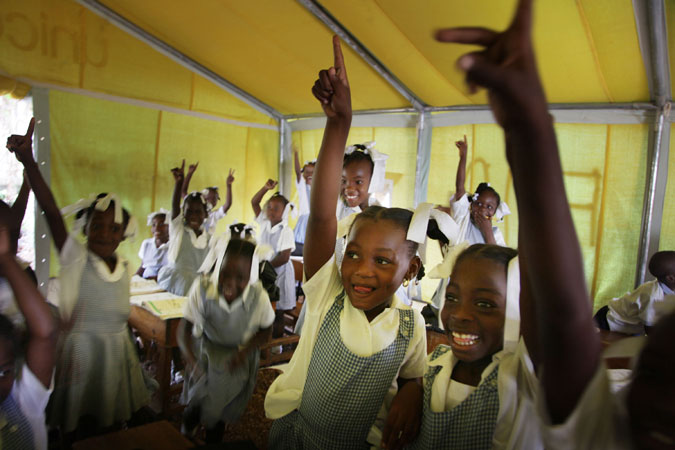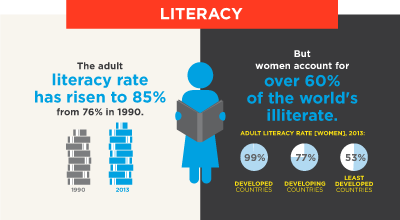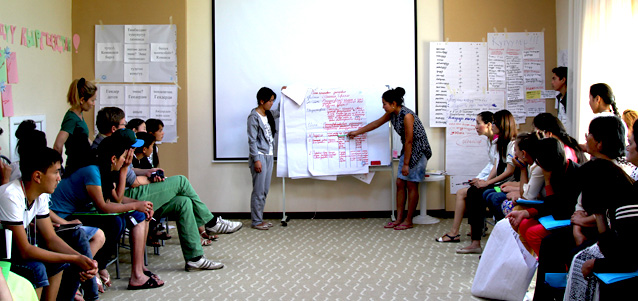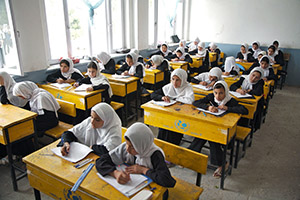SDG 4: Ensure inclusive and equitable quality education and promote lifelong learning opportunities for all

Targets
- By 2030, ensure that all girls and boys complete free, equitable and quality primary and secondary education leading to relevant and Goal-4 effective learning outcomes.
- By 2030, ensure that all girls and boys have access to quality early childhood development, care and preprimary education so that they are ready for primary education.
- By 2030, ensure equal access for all women and men to affordable and quality technical, vocational and tertiary education, including university.
- By 2030, eliminate gender disparities in education and ensure equal access to all levels of education and vocational training for the vulnerable, including persons with disabilities, indigenous peoples and children in vulnerable situations.
- By 2030, ensure that all youth and a substantial proportion of adults, both men and women, achieve literacy and numeracy.
- By 2030, ensure that all learners acquire the knowledge and skills needed to promote sustainable development, including, among others, through education for sustainable development and sustainable lifestyles, human rights, gender equality, promotion of a culture of peace and non-violence, global citizenship and appreciation of cultural diversity and of culture’s contribution to sustainable development.
- Build and upgrade education facilities that are child, disability and gender sensitive and provide safe, nonviolent, inclusive and effective learning environments for all.
- By 2030, substantially increase the number of youth and adults who have relevant skills, including technical and vocational skills, for employment, decent jobs and entrepreneurship.
- By 2020, substantially expand globally the number of scholarships available to developing countries, in particular least developed countries, small island developing States and African countries, for enrolment in higher education, including vocational training and information and communications technology, technical, engineering and scientific programmes, in developed countries and other developing countries.
- By 2030, substantially increase the supply of qualified teachers, including through international cooperation for teacher training in developing countries, especially least developed countries and small island developing States.
All developing regions of the world have achieved — or almost achieved — equal enrolment of boys and girls in primary school. This is an historic accomplishment, but far from complete. In sub-Saharan Africa, only 23 per cent of poor rural girls finish primary school. Gender gaps widen significantly in many countries in secondary and tertiary schools [1].

Education is a right. It empowers individuals to increase their well-being and contributes to broader social and economic gains. Improved education accounts for about 50 per cent of economic growth in Organisation of Economic Co-operation and Development countries over the past five decades [2]. About half is due to more women entering higher levels of education, and greater equality as to the years men and women spend in school[3].
For education to deliver, it must be inclusive and high-quality. Active efforts to end gender stereotypes must tackle those that limit schooling or channel women and girls into ‘acceptable’ areas of study or work.
For all girls and boys, men and women, education must be available across their lifetimes. Pre-primary education establishes a foundation on which all later schooling can build. Ongoing learning for adults broadens choices for productive and fulfilling lives.
UN Women acts to promote education — a core pre-requisite for gender equality and women’s rights – through the revision of school curricula and policies to counteract gender discrimination, improving access to information technologies, and training for teachers, students and parents. Along with the World Association of Girl Guides and Girl Scouts, UN Women has developed a non-formal educational curriculum to prevent violence against women and girls, which educators and youth leaders are being trained to deliver in more than a dozen countries.
Stories
Coming of age, youth become gender equality champions in Kyrgyzstan
A UN Women project supported by the UN Peacebuilding Fund, is gathering peer educators and teachers from seven regions of Kyrgyzstan for a series of trainings to deepen their knowledge of gender equality, violence against women, bride kidnapping and forced early marriage.
In Afghanistan, women and girls strive to get an education
In a country where education for all remains a challenge, UN Women is supporting efforts to reach women and girls through English classes and trainings in computer skills.
Notes
[1] UNESCO, UNICEF (2015), Fixing the Broken Promise of Education for All: Findings from the Global Initiative on Out-of-School Children
[2] OECD (2012), Gender Equality in Education, Employment and Entrepreneurship: Final Report to the MCM 2012, p. 19.
[3] ibid.

